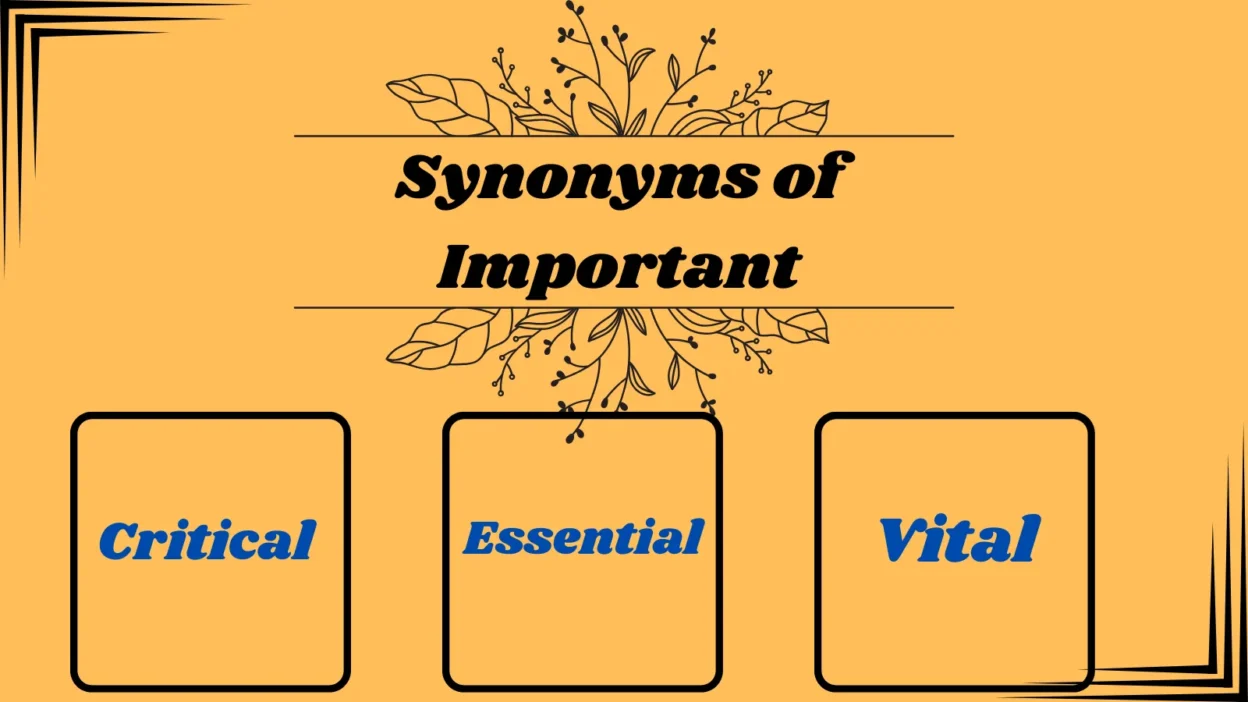Synonyms of Important, such as significant, crucial, essential, and vital, describe something that holds great value, influence, or consequence. Whether it’s an important decision, an important event, or a tank role, these words express seriousness, impact, or priority in communication.
People often say, “This is an important step in my career,” or “Family is the most important thing in my life.” But depending on tone or context, you can choose alternatives that sound more formal, emotional, or nuanced.
In this article, we’ll explore the best synonyms of important, explain their subtle differences, and provide examples so you can express significance, priority, and value with precision and variety.
What Does Important Mean?
Important means something that holds great value, influence, or necessity. It describes people, ideas, or actions that have a strong effect on outcomes or decisions. When something is important, it deserves attention, respect, and priority because it can shape what happens next.
In simpler terms, important refers to anything that matters deeply or cannot be ignored.
Example Sentences:
- “Getting enough sleep is important for good health.”
- “This meeting is important for the future of our company.”
- “Family is the most important thing to her.”
Key Points to Remember:
- Important expresses value, influence, or necessity.
- It can apply to people, events, or actions.
- Commonly used in academic, professional, and personal contexts.
Synonyms & Related Words for Important (And When to Use Them)
1. Significant
Use when something has a deep meaning or a notable effect.
- The new law had a significant impact on education.
- Her promotion marked a significant milestone in her career.
2. Crucial
Best for something necessary for success or survival.
- It’s crucial to submit the form before the deadline.
- Communication is crucial in any healthy relationship.
3. Vital
Implies something is essential to life or function.
- Oxygen is vital for human survival.
- We must maintain transparency during the process.
4. Essential
Use when something is required or can’t be done without.
- Water is essential for all living beings.
- She brought only the essential items on the trip.
5. Key
Informal and often used in business or strategy contexts.
- Trust is the key to long-term customer loyalty.
- He played a key role in the negotiations.
6. Noteworthy
For something deserving attention or worth mentioning.
- Her performance was noteworthy among all the candidates.
- It’s a noteworthy fact that he’s never lost a match.
7. Paramount
Conveys the highest level of importance.
- Safety is of paramount concern in this industry.
- It’s paramount that we act quickly.
8. Influential
Describes a person or thing with the power to shape outcomes.
- She’s one of the most influential thinkers of our time.
- His speech was incredibly influential in swaying public opinion.
9. Momentous
Best for events or occasions that mark history.
- The election was a momentous event.
- Their decision to marry was a momentous one.
10. Substantial
Indicates something with considerable weight, size, or value.
- The donation was substantial enough to fund the whole program.
- They made substantial progress in just one week.
11. Weighty
Used for matters that are serious or emotionally heavy.
- The judge had a weighty decision to make.
- It’s a weighty topic that deserves discussion.
12. Meaningful
When something carries emotional or symbolic value.
- Their gift was small but meaningful.
- He shared a meaningful glance with his old friend.
13. Critical
For situations where timing or precision is urgent.
- We must launch before the holiday season.
- His condition is critical and requires constant care.
14. High-priority
Common in workplace or organizational settings.
- The issue was labeled high-priority by the tech team.
- Responding to client emails is always a high-priority task.
15. Monumental
Describes something massive in size or consequence.
- Climbing Mount Everest is a monumental achievement.
- They faced a monumental challenge ahead.
16. Pressing
Use when there’s urgency or time sensitivity.
- Climate change is a pressing global issue.
- She had a pressing need to speak with her doctor.
17. Pivotal
Highlight turning points or key moments.
- The meeting was pivotal in shaping future strategy.
- His decision to leave was a pivotal moment in her life.
18. Central
Used when something is at the heart of an issue.
- Education is central to economic development.
- Her role was central to the project’s success.
19. Relevant
Best when discussing something that matters in context.
- Your skills are highly relevant to this role.
- The document wasn’t relevant to the discussion.
20. Imperative
Sounds formal and commanding; best for instructions.
- All staff must attend the briefing.
- Honesty is imperative in legal matters.
21. Salient
For highlighting something that stands out noticeably.
- The most salient feature of the plan was its simplicity.
- He made a salient point during the debate.
22. Integral
Refers to something that completes a whole.
- She’s an integral member of the team.
- The arts are integral to a well-rounded education.
23. Indispensable
Stronger than “important”—you can’t do without it.
- His advice proved indispensable during the crisis.
- A good mentor is indispensable for career growth.
24. Strategic
Best in planning, leadership, and decision-making contexts.
- This was a strategic move to gain market share.
- They chose a strategic location for the store.
25. Consequential
Formal tone: use when decisions lead to big outcomes.
- It was a consequential ruling by the court.
- These are consequential choices for the company.
26. Major
Casual yet impactful; the opposite of minor.
- This is a major update to the software.
- Losing the contract was a major blow.
27. Influencing
Focuses on shaping opinions or outcomes.
- He had an influential presence in the room.
- The media is influencing public opinion every day.
28. Compelling
Use when something demands attention or a response.
- She made a compelling case for reform.
- The documentary was emotionally compelling.
29. Powerful
Describes something strong and commanding.
- Her words were powerful and heartfelt.
- It’s a powerful message that resonated with many.
30. Respected
Use for people whose importance comes from status or admiration.
- He’s a respected leader in the field.
- Their respected opinion swayed the decision.
How to Choose the Right Synonym
The right synonym depends on context, tone, and emotional weight:
- Use “crucial,” “vital,” or “imperative” when you need urgency.
- Pick “noteworthy,” “meaningful,” or “compelling” for emotional or symbolic value.
- Choose “strategic,” “influential,” or “central” in business or policy writing.
- Prefer “momentous,” “monumental,” or “pivotal” when discussing historical or life-changing events.
- Go with “essential” or “indispensable” when discussing absolute necessities.
Cultural and Emotional Contexts: In formal documents, words like “paramount” and “imperative” convey authority. In personal writing, “meaningful” and “powerful” create emotional resonance.
Conclusion
Learning synonyms of “important” lets you fine-tune your message. Instead of always saying something is “important,” you can now describe it as pivotal, critical, or meaningful—each with its shade of meaning. With these 30 carefully selected alternatives, you’ll add variety and precision to your language while tailoring your tone to match the moment. Choose wisely, and your writing will not only inform but also inspire.





